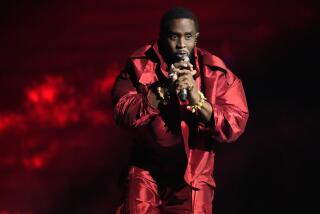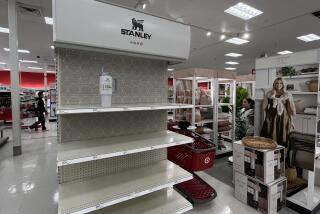Takeover battle on tap?
Could this Bud be for the Belgians?
On Wednesday, giant Belgium-based brewer InBev made an unsolicited offer worth roughly $46 billion for the American brewing icon Anheuser-Busch Cos..
Such a combination would create the world’s largest brew meister, with brands that would reach from Brussels to Beijing to Buffalo. But no matter who is in control, Anheuser-Busch faces a difficult task finding a way to sell more to the legions of beer drinkers in the United States.
Anheuser-Busch, which controls 49% of the U.S. beer market, said its board of directors “will evaluate the proposal carefully.” But according to Wall Street analysts, the board and management won’t be raising a cold one to salute the deal, despite the 11% premium InBev is offering over the St. Louis-based brewer’s closing stock price Wednesday.
Management would prefer to remain independent, “but given the relatively small position held by the Busch family, it may be difficult for them to dismiss an approach from an outsider,” Banc of America Securities analyst Bryan Spillane wrote to investors as reports of the proposed bid swirled this week.
Although profitable, Anheuser-Busch has been troubled in recent years by changing consumer tastes and stagnant sales of its flagship Budweiser and Bud Light brands. That’s left the company, and its signature team of Clydesdale draft horses, vulnerable to a takeover.
“Anheuser-Busch is littering the country with a liquid that is the lowest form of beer,” said Glenn Sawada, 36, of Seal Beach, who like many other beer drinkers has gravitated to what he described as “more flavorful craft brews from smaller brewers.”
Gary Cooper, 48, of Los Angeles voiced similar disdain while drinking after work at Pete’s Cafe & Bar downtown. He doesn’t drink Bud “unless somebody else buys it. . . . Bud is a beer you refer to when finances are a concern.”
Sawada and Cooper are representative of the trouble that Budweiser and mass-market American brands such as Miller and Coors face when trying to grow profitably in the U.S., said Tom Pirko, president of Bevmark, a Buellton, Calif.-based beverage industry consulting firm.
“The average consumer sees no difference between Bud Light, Miller Lite and Coors Light because they are commercialized beers that have turned the business into a commodity,” he said.
Some beer drinkers hope the deal won’t go through. As he sipped a Bud at the La Cita bar in downtown Los Angeles, Israel Torres said, “I’ve been drinking Budweiser since I was born.” Torres, 41, estimates he drinks 24 bottles of the stuff a week.
“I don’t see the reason why a foreign company has to buy Budweiser,” he said. “I am satisfied with the American way of Budweiser.”
The primary ways the major domestic brands differentiate themselves is through price and advertising, and those aren’t healthy paths to profits, Pirko said.
This has sparked consolidation in the American beer industry. In October, SABMiller, the British parent of Miller Brewing Co., announced plans to team up with Molson Coors Brewing Co. to create a joint venture claiming about 30% of the U.S. beer market.
Americans drank about $97 billion worth of beer last year, a 1.4% increase from 2006, according to Boulder, Colo.-based Brewers Assn. But virtually all of the increase came from sales of craft and microbrews and imports. Sales of the mass-produced beers made by Anheuser-Busch have gone flat in recent years as young adults gravitated to wine and spirits, as well as craft beers.
Still, the $65-a-share bid might not be enough to quell the resistance from the Busch family and company managers, Pirko said. The Teamsters union, which transports Anheuser-Busch products, and the distributors are also comfortable with the status quo.
Anheuser-Busch shares shot up more than $4 to $62.73 in after-hours trading after the company confirmed the bid. During regular trading Wednesday, the stock rose $1.20 to close at $58.35.
Pirko said he expected a deal to get done eventually, but at a price closer to $75 a share.
Others aren’t so sure. Resistance to a buyout is likely to be fierce among the union workforce and independent distributors. Hostile bids are very difficult to carry out in the alcoholic beverage business, Jonathan Feeney, an analyst with Wachovia Capital Markets, wrote in a report on InBev’s offer. He said: “The highly regulated nature of the beer industry could pose other deal difficulties.”
InBev was formed in 2004 through the combination of Belgium’s Interbrew and AmBev, South America’s biggest brewer. It has a reputation for slashing jobs and marketing budgets in an effort to juice profits, according to Pirko.
And Feeney expects “InBev would focus its efforts on streamlining the U.S. beer giant.”
Analysts said that the company’s theme parks, including SeaWorld Adventure, could quickly be put on the block if the deal is completed.
Perhaps sensitive to its reputation as a cost cutter, InBev offered to make St. Louis the headquarters of the combined company’s North American region. “Together, we would draw on the collective expertise of both companies’ management and employees,” said Carlos Brito, chief executive of InBev.
But others said it would make little difference in their drinking habits.
“I drink it for the alcohol content, not for who makes it. . . . Nowadays, it’s one world,” said Noah Walsh, 32, of Santa Monica, who was at Pete’s drinking a Bud Light.
“It’s not the USA versus anyone else. Business is business.”
--
andrea.chang@latimes.com
Times staff writer Lisa Girion contributed to this report.
--
(BEGIN TEXT OF INFOBOX)
Brew barons
Company/brewer: Share of world beer market*
1. InBev: 13.9%
2. SABMiller: 11.8
3. Anheuser-Busch: 11.5
4. Heineken: 8.3
5. Carlsberg Breweries: 4.5
6. Scottish Courage: 3.5
7. China Resources Enterprise: 3.3
8. Molson Coors Brewing: 3.1
9. Grupo Modelo: 3.1
10. Baltic Beverages Holding: 2.9
*2006 data, latest available
Source: Impact newsletter
--
Beer giants
InBev
Headquarters: Belgium
Employees: 89,000
Business: Beer, soft drink production
Major brands: Beck’s, Brahma, Leffe, Stella Artois
Biggest markets: Latin America, Central/Eastern Europe
2007 sales: $19.7 billion
Anheuser-Busch
Headquarters: St. Louis
Employees: 30,800
Business: Beer production, theme parks
Major brands: Budweiser, Bud Light
Biggest markets: United States, China
2007 sales: $16.7 billion
Source: Company reports







